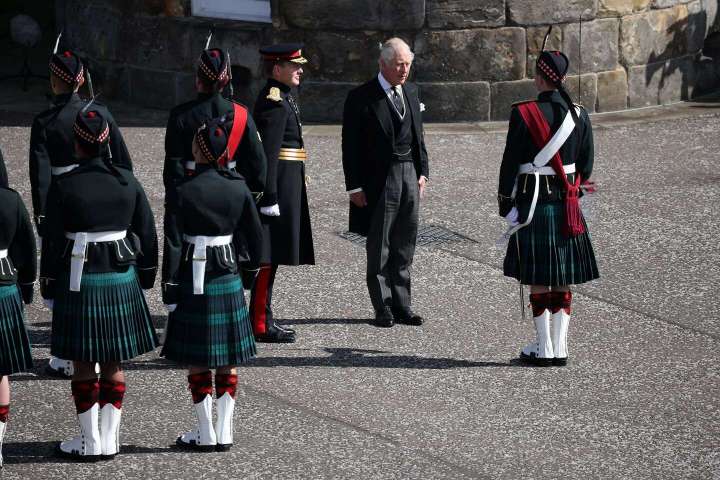EDINBURGH, Scotland — There’s no question that the British royal family has the closest of ties to Scotland, and the people deeply respected the queen. But the question with her passing is what comes next?
The royal family’s history with Scotland in focus as the queen lies at rest

The queen savored her royal estate in the Scottish Highlands, all 50,000 acres of it, where she spent her summers, on the vast moors and glens, shooting the occasional red deer stag. Her family called it “her happy place.”
Her son, King Charles III, attended boarding school in remote Scotland, Gordonstoun, with its cold showers and bullying, which he credits with teaching him about hard work. He established a hub for his Prince’s Foundation, and its sustainability advocacy, at Dumfries House in Scotland.
Charles even looks comfortable in a kilt.
The queen died at Balmoral Castle and her coffin — bedecked with white heather, dahlias and sweet peas, all cut from the royal gardens at her estate — made the 175-mile, six-hour journey to the Palace of Holyroodhouse in Edinburgh on Sunday.
Thousands lined the roadways, taking photographs. Some were silent, some waved. After the cortege passed, bagpipes played, in spontaneous, very local moments.
When the procession entered Edinburgh, most mourners were silent, but there were also choruses of boos heard.
Reporters at the scene on Sunday evening witnessed police arrest a protester at St. Giles who held up a placard with a more obscene version of “down with imperialism, abolish monarchy.”
Someone shouted, “Let her go, it’s free speech!” Others urged onlookers to “have some respect.”
In Edinburgh, Sophie Campbell, 63, retired shop clerk, was out early awaiting Monday’s procession. Expressing dual loyalties, Campbell said she would welcome Scotland becoming an independent nation, but keeping the king. “It would be the best of both worlds,” she said. “Old and new.”
Campbell said many Scots have no problem with the monarchy. “They’re part of our history.” But she explained, “people in Scotland have problems with the English,” with Boris Johnson and the ruling elites in London.
Daniel Wincott, professor of law and society at Cardiff University, noted that the leaders of the pro-independence Scottish National Party have been “fulsome” in their respectful comments and “praise for the queen” in her death.
But, he said, he could still envision that, after a short period of “coming together” upon the queen’s death, the ties that bind the United Kingdom together could “loosen.”
During the independence referendum in Scotland in 2014, which saw Scotland reject leaving the union, SNP leaders made clear that any newly formed nation would retain the monarch as head of state.
Deputy First Minister of Scotland John Swinney, a leader of the SNP, repeated the promise to BBC radio on Monday, that “His Majesty the King should be the head of state of an independent Scotland.”
He said, “and it’s what we will continue to argue.”
Not all agree. The leaders of Green and Alba parties in Scotland say they want to part with the monarchy after independence.
A major survey in May, for the think tank British Future, found 45 percent in Scotland wanted to retain the monarchy — with 36 percent saying the end of the queen’s reign would be the right moment to move to a republic.
On the question of Scottish independence, the queen was mostly mute. But not quite.
At Crathie Kirk, the small Church of Scotland parish, where the royals attend Sunday service when at Balmoral, Elizabeth paused to speak to someone in the crowd before the 2014 referendum. She was overheard to say, “well, I hope people will think very carefully about the future,” widely interpreted as a nudge to vote against independence.
Tim Shipman, political editor at the Sunday Times of London, said this was no slip of the tongue. Reporters had been alerted to keep an ear out for her remark.
David Cameron, prime minister at the time, was caught on a hot mic saying the queen “purred down the phone” when he reported that his campaign against Scottish independence had succeeded. He later apologized for revealing a private conservation with the monarch.






